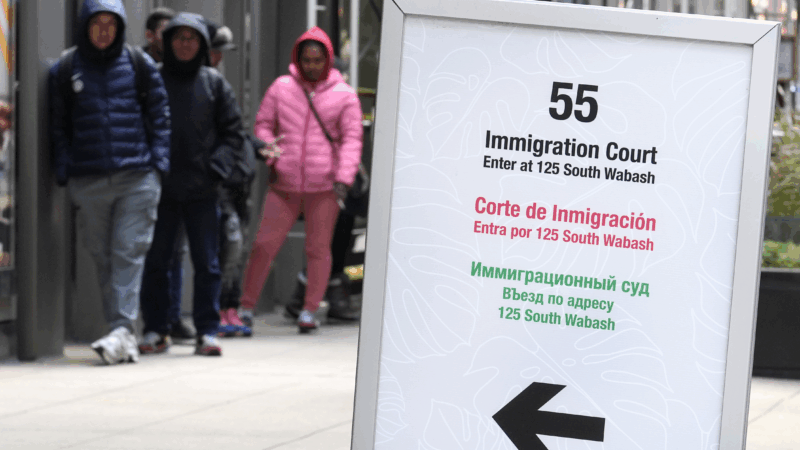Bills Could Make it Harder for Gay Couples to Adopt
Nate has two mommies, Betsy and Leslie Allen.
At their home in Vestavia Hills, two-year-old Nate watches PBS Kids while he munches on pizza and apples and drinks milk from his University of Alabama sippy cup.
Betsy and Leslie adopted Nate at birth in March 2015 from a couple in Oklahoma. At the time, Alabama didn’t recognize Betsy and Leslie’s marriage, and they struggled to find an adoption agency in the state willing to work with a gay couple.
“It was mostly based on state laws,” Betsy says. “For example, we couldn’t both be on the birth certificate.”
“That was what was important to us was both being on the birth certificate,” Leslie adds.
That changed when the U.S. Supreme Court legalized same-sex marriage in 2015. Alabama now recognizes Betsy and Leslie’s marriage and both women are listed as Nate’s parents. Leslie says they would love to give Nate a little brother or sister, but the first adoption process drained them, both financially and mentally.
“Alabama, it felt like to us, threw up hurdles every way they could to prevent us from adopting, Leslie says”
And it may get even harder for same-sex couples in Alabama to adopt children. The Legislature is considering a pair of bills that would give faith-based adoption agencies the right to turn away couples they believe conflict with their religious beliefs. The House of Representatives recently passed a bill and a similar bill is moving through the Senate. As it stands, the state could potentially take away an agency’s license for discriminating. Rep. Rich Wingo sponsored the House bill. He says it’s about protecting religious freedom in the wake of the sweeping legalization of same-sex marriage.
“Since the beginning of time marriage has been defined as between a man and a woman, Genesis 2,” he says. “June 30th, 2015, our [U.S.] Supreme Court changed that definition.”
The proposed bills would protect faith-based agencies that don’t receive taxpayer money. And only about 30 percent of adoption agencies in Alabama are faith-based, Wingo says.
“Meaning that 70 percent are secular. So, it’s not that anybody’s trying to prevent anybody from adopting or fostering,” he says. “That’s not the point at all. This bill is simply focusing on the state do [sic] not discriminate against these faith-based agencies by pulling up their license or not renewing their license.”
Wingo argues that if faith-based adoption agencies lose their licenses and have to close down, the children become wards of the state. But attorney Rick Wyatt, president of Family Adoption Services in Homewood says that’s unlikely in Alabama.
“We have significantly more prospective adoptive families than there are children for adoption,” Wyatt says. “If an agency had to close down, for example, those children could very easily be taken over by other agencies and placed very easily.”
Wyatt says his agency operates on Christian values but isn’t faith-based and doesn’t discriminate because of sexual orientation, religion or other beliefs. The adoption bills don’t mention same-sex couples outright, but Wyatt says, it’s obvious that’s who they’re targeting. He adds that the bills are pretty broad and that could lead to other issues.
“If a Jewish couple or a couple of a different faith came to them and the agency decided to refuse to serve that couple or that individual they would actually be discriminating also,” he says.
Alabama is not an outlier for wanting to protect faith-based adoption agencies. Similar laws are on the books in other states. And with a conservative supermajority in the Alabama Legislature and a governor who touts strong Christian values, it’s possible that at least one of the bills will become law in this state too.
Nancy Guthrie search enters its second week as a purported deadline looms
"This is very valuable to us, and we will pay," Savannah Guthrie said in a new video message, seeking to communicate with people who say they're holding her mother.
Immigration courts fast-track hearings for Somali asylum claims
Their lawyers fear the notices are merely the first step toward the removal without due process of Somali asylum applicants in the country.
Ilia Malinin’s Olympic backflip made history. But he’s not the first to do it
U.S. figure skating phenom Ilia Malinin did a backflip in his Olympic debut, and another the next day. The controversial move was banned from competition for decades until 2024.
‘Dizzy’ author recounts a decade of being marooned by chronic illness
Rachel Weaver worked for the Forest Service in Alaska where she scaled towering trees to study nature. But in 2006, she woke up and felt like she was being spun in a hurricane. Her memoir is Dizzy.
Bad Bunny makes Puerto Rico the home team in a vivid Super Bowl halftime show
The star filled his set with hits and familiar images from home, but also expanded his lens to make an argument about the place of Puerto Rico within a larger American context.
Japan’s Takaichi to pursue conservative agenda after election landslide
Japan's first female Prime Minister, Sanae Takaichi, brought the ruling Liberal Democratic Party its biggest-ever electoral victory, fueling her ambitions to pursue to a political agenda which she says could "split public opinion."






